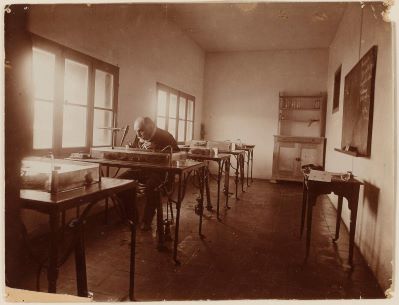Henri de Lacaze-Duthiers's archives

The archives containing the fonds described here correspond to a virtual reconstitution of the Henri Lazaze-Duthiers archive fonds. This reconstitution includes four different sources: the Roscoff Biological Station (SBR), the Banyuls-sur-Mer Oceanological Observatoire (OOB), the Academy of Sciences and the private fonds of the descendants of Pierre Lanceplaine, Lacaze-Duthiers’ successor.
The dispersal of the archives in these four places started during its producer’s lifetime. In fact, due to the dispersal by Lacaze-Duthiers between his two stations and the simultaneous and remote administration of the latter, the fonds was both produced and preserved in the two stations. Upon his death, his archives were mostly gathered in the OOB, and a preserved part was left between his Las Fons and Roscoff properties. Under the Occupation, the OOB, wishing to protect its heritage, dispersed its archives among the inhabitants of the town, which led to losses but also returns, little by little, over several decades and through discoveries. To finish, between 1976 and 1977, the OOB library sent most of the Lacaze-Duthiers archives which it preserved to the archives department of the Academy of Sciences.
Thus, in 2021, the bi-centenary of Lacaze-Duthiers’ birth, the provisional collation project for his fonds started in order to digitise it and reconstitute it virtually. Between 2021 and 2022, the Sorbonne University Library, with the SBR and the OOB, organised the collation of the archives, which were preserved in the stations, on the Pierre and Marie Curie campus, together with those preserved in the Academy of Sciences and in Las Fons for which loan agreements were signed.
Félix Joseph Henri de Lacaze-Duthiers, known as Henri de Lacaze-Duthiers, was born on 15 May 1821 in Montpezat (Lot-et-Garonne). When he was studying medicine in Paris, he developed a passion for zoology and submitted a natural sciences thesis after his medicine thesis. He was a professor in the Lille Faculty of Sciences, the École Normale supérieure, the National Museum of Natural History and finally, the Sorbonne. He remained a field researcher and went on research trips in the Balearic Islands, Brittany and Algeria, during which he specialised in marine biology, more specifically in coral studies. His book Natural History of the Coral became a work of reference on this subject. He also became a builder by initiating the creation and equipment of the Sorbonne marine stations, first of all in Roscoff in Brittany (today, the Roscoff Biological Station), then in Banyuls-sur-Mer (today, the Banyuls-sur-Mer Oceanological Observatoire). Lacaze-Duthiers administered the two stations as director, and made them places with abundant scientific activities, receiving many residents. In order to report on the works conducted within his two stations, Lacaze-Duthiers also funded the review of the Experimental and General Zoology Archives. A member of different scholarly societies and elected to the internationally recognised Academy of Sciences in 1871, he maintained close scientific correspondence with his colleagues. He died in his Las Fons property on 21 July 1901 and left a considerable scientific, property and archival heritage. These three related elements illustrate a period of change in scientific practices, and more specifically a turning point in the history of zoology, his practice and his teaching, in France and the rest of the world.
The Henri Lacaze-Duthiers archives are relatively comprehensive, illustrating the different aspects of his life and his activity. Among them, we have found his research and teaching documents, and those related to the founding and administration of the marine stations, as well as his subsequent correspondence. The scientific context and attachment of the natural sciences fonds were taken into account during the description, particularly during the indexation of the taxa. In fact, Lacaze-Duthiers specifically informed about the taxa and specimen sampling locations, their elements were re-transcribed in order to enable an epistemological and critical study. The taxa, whose form changed, were subject to additional indexation, including the form accepted in 2022 (WoRMS reference). Reunited, the Lacaze-Duthiers archives contain rich research material for history.
This is for Henri Lacaze-Duthiers and his stations’ history, but also more importantly for the history and sociology of 19th century science. These archives illustrate the individual’s importance in the institution, his personality and his place in the administration, as well as in the eviction or failure of projects. The fonds demonstrate the administration and social network of higher education and research, in France and in the West, but also the initiatives and private relationships which participate in scientific knowledge and progress. In fact, we have come across many institutions, associations and personalities in the administrative documents and in the correspondence. Among them, we have noticed that the following have been documented or cited: the French and British scientific advance associations, almost all the French and Western marine stations, the local scholarly societies, the zoology autodidacts, the university zoology and physiology museums and laboratories etc.
The eight elements which make up the digitised Lacaze-Duthiers archive fonds:
- Marine stations archives
- Reports and publications
- Correspondence
- Lessons and teaching
- Memoirs and personal notebooks
- Scientific research and works
- Scientific works received by Lacaze-Duthiers
- Professional and science life
More information on this archive fonds in Calames




